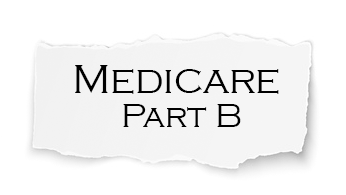So you’re turning 65…
If you’re turning 65, you’re most likely eligible for Medicare. But what exactly is Medicare? It’s confusing to understand all the different parts and coverage levels. In this article, we’ll give you a brief overview of Medicare Part B.
Medicare Part B covers medically necessary services like doctor’s visits, outpatient care, mental health services, and some preventive services. Part B also covers some clinical research and durable medical equipment.
Medicare Part B complements Medicare Part A. Part A covers various costs related to staying in a medical facility, including hospitals, skilled nursing facilities (rehabilitation), hospice and some types of home health care. Medicare Part A covers hospital coverage and Part B covers medical services (ie. doctors, lab work)
You pay a monthly premium for Part B (based on your income level), and you may also have to pay a deductible and coinsurance for medical services. Sometimes, Medicaid helps pay for your Part B premium depending on your state’s income requirements.


What is Medicare Part B?
Medicare Part B is an important medical insurance program available to most U.S. citizens who are age 65 or older or meet other eligibility requirements. It helps cover the costs of medical services and certain medications (outpatient prescription drugs). Some services covered by Part B include doctor visits, mental health care, emergency services, outpatient treatment, and durable medical equipment (DME).
Part B also covers many preventive healthcare services, such as screenings, vaccines, and tests for certain types of cancer. Part B also covers some costs related to clinical research.
To enroll in Medicare Part B, individuals must meet certain criteria, including age or disability. Individuals also have to pay a monthly premium for Part B coverage, as well as an annual deductible and coinsurance.
Who is eligible for Medicare Part B?
To be eligible for Medicare Part B, you must be:
- Individuals aged 65 or older
- Individuals under 65 with certain disabilities
- Individuals with end-stage renal disease (ESRD)
- Individuals with amyotrophic lateral sclerosis (ALS)

When do I sign up for Medicare Part B?
The initial enrollment period to sign up for Medicare Part B is a 7-month window. Three full calendar months before your 65 birthday, your birthday month and 3 months after your birthday month.
(3 + 1 + 3). If an individual does not enroll in Medicare Part B within the allotted period, they may have to pay a penalty for late enrollment.
In most cases, individuals become eligible for Medicare Part B on the first day of the 3rd month before their 65 birthday. For example, if you turn 65 on June 15th, then you are eligible to enroll in Medicare Part B on March 1st. You must be enrolled within the 7-month window to avoid penalties*, except in special situations. To avoid late enrollment penalties, you need to qualify for a special enrollment period.
How do I pay for Medicare Part B?
Once someone enrolls in Medicare Part B, they will pay the monthly premium. The premium is automatically deducted from the individual’s Social Security benefits. If the individual is not receiving social security, they may have the premium deducted from their bank account.
Click on the button below to see Medicare Part B premium, deductible, co-pays and co-insurance amounts.
What does Medicare Part B cover?
Medicare Part B covers many medically necessary services, including:
1. Doctor services
2. Outpatient care
3. Preventive services
4. Laboratory tests
5. X-rays
6. Mental health services
7. Physical therapy
8. Durable medical equipment
9. Home health services
10. Ambulance services
11. Preventive vaccines
12. Some prescription drugs (administered by a healthcare provider)
Medicare Part B does not cover medical services received in other countries.
How can I get help to pay for Medicare Part B?
If you need help to pay for Medicare Part A and Part B premiums, you may be eligible for help. Depending on your income and financial situation, you may qualify for several programs, such as Medicaid, the Low-Income Subsidy from the federal government, or even state-level aid offered through your state’s Medicaid program.
You may also be eligible for financial help from organizations such as the Medicare Rights Center and the National Council on Aging, both of which help seniors who may not qualify for Medicare or Medicaid.
Finally, if you find that you can’t afford to pay your Part B premiums, you may qualify for a premium assistance program such as Medicare Savings Programs, which can provide assistance with paying your Part B premiums. To find out if you qualify, you need to speak to your state Medicaid office to find out if your state has a program available.
Medicare Educational Videos
Medicare Part B is an important component of the Medicare program that covers a wide range of healthcare services. Overall, Medicare Part B plays a critical role in ensuring access to quality healthcare for millions of Americans. See below for related links…
Medicare Part A and B Prior Authorization
Part B Clinical Research Study Coverage

